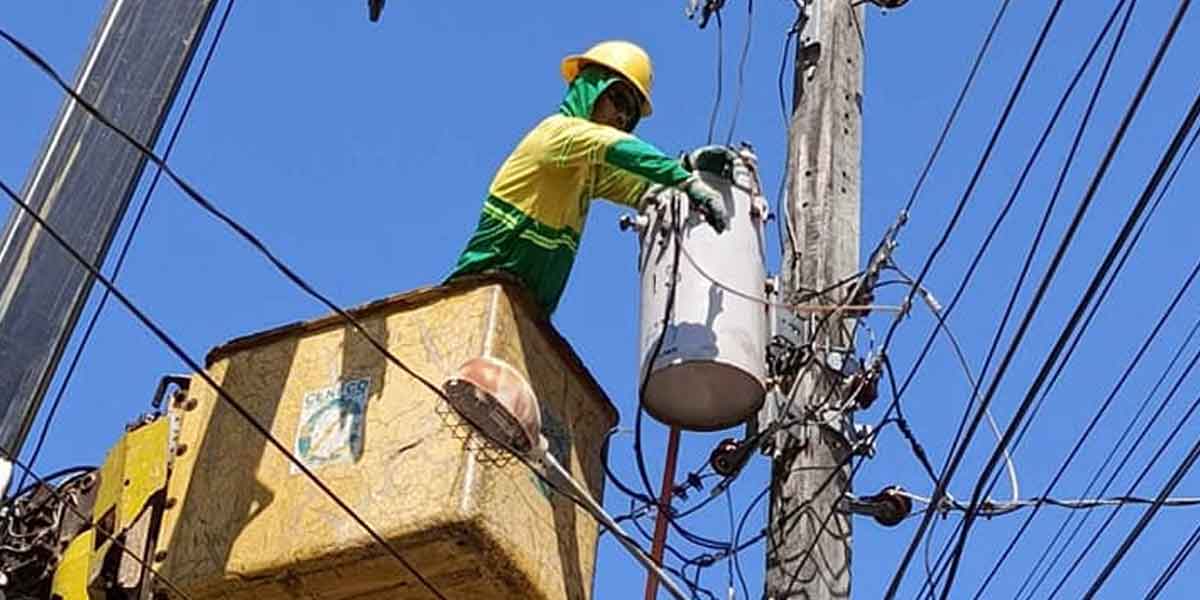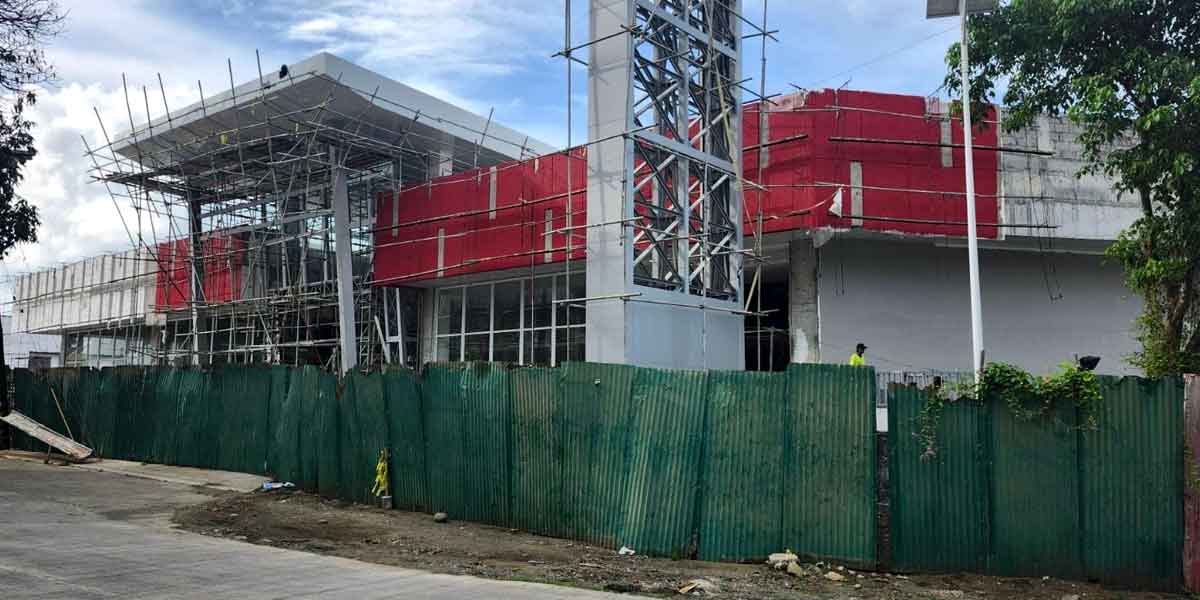
Story and photos by Emme Rose Santiagudo
Vendors of the Molo public utility vehicle (PUV) Terminal at Barangay San Pedro in Molo, Iloilo City are caught between the coronavirus disease (COVID-19) pandemic and losing the terminal that has become their home and source of income for more than 30 years.
In an executive order issued last week, the Iloilo City government mandated the closure of the Molo PUV Terminal for various violations of memorandum circulars and ordinances of the city.

Vendors, porters, and operators were only given three days to vacate the area and transfer to the Mohon Terminal in Arevalo district.
The sudden closure order came as a surprise for 78-year-old Rosario Lopez, one of the vendors and the former president of San Pedro Molo Vendors Association.
“Nakibot gid kami insigida tatlo ka adlaw pahalinon na kami. Daan diri lang kami nagakuha sang income namon nga panggastos sa pangadlaw-adlaw,” Lopez told Daily Guardian.
A senior citizen, Lopez sold food products at the terminal to earn money for her daily medicines and other needs.
“Ako senior citizen na ko, indi na ko kabakal sang bulong ko sa subong diin na kami makadto kag mabaligya,” she lamented.
When Iloilo City was placed under Enhanced Community Quarantine (ECQ), Lopez was also forced to stay home as movement of senior citizens and other members of the vulnerable sector were restricted.
“Subong tani gusto man namon makabawi kay nagaamat-amat na balik ang mga pasahero pero maano na lang kami sini liwat kon masirado na ang terminal,” she said.
For one of the stall owners, 40-year-old Rosanna Damasco, the terminal was her only hope as the pandemic crippled her part-time work.
“I already resigned from my work on July 1. Supposedly, I wanted to focus here and help my sister provide the needs of our family. Then, this unfortunate thing happened,” she said in Hiligaynon.
Back in their hay days, Damasco recalled how they would earn up to P1,000 daily from just selling food products in the terminal. It was the time before the Covid-19 pandemic limited the movement of people and mandated them to stay at home.
“Sang una dako pa ang income makaginansiya ka P1,000 libod-libod lang na. Amo na umulan or uminit diri na gid kami although pigado na gid kami ya subong,” she said.
It was in 1986 when Molo Terminal was first established to cater to provincial utility buses (PUBs), and vans from all-over Panay island, according to Lopez.
The terminal served as the second home for more than 140 vendors and barkers who grew up in the area.
Twenty-eight-year-old KC said he started working as a vendor way back in his elementary school days. His earnings from the terminal became his daily school allowance.
“Dako gid ang epekto sa amon, diri na ko ya gapangita sang pangitan-an ko halin sang elementary ko pati mga balon ko sa eskwelahan,” he said.
Before the pandemic, KC worked as a part-time beautician. But his job was also affected by the COVID-19 crisis.
KC and other vendors thought that the terminal would somehow sustain them as they slowly recover from the crisis.
“Tiyempo crisis subong tani tagaan kami abiso, tiyempo kay ang mga tawo di bag-o pa lang ka tibawas tanan man kami di apektado. Three months wala ka open ang mga kiosk nagkalapirdi na tapos subong nangita naman kami kapital kag nangumpra dayon amo naman ini isarado naman ang terminal,” he lamented.

CLOSURE ORDER
Mayor Jerry Treñas has ordered the closure of Molo Terminal through Executive Order (EO) No. 95 issued on June 30, 2020.
The mayor said the terminal failed to comply with previous memorandum circulars of Land Transportation and Franchising Regulatory Board (LTFRB) particularly LTFRB Memorandum Circular Nos. 2017-030, 2017-010, and 2008-013.
LTFRB Memorandum Circular No. 2017-030 set the guidelines for off-street terminal operations (Omnibus Franchising Guidelines) while LTFRB Memorandum Circular No. 2017-10 provided the implementing guidelines on the transition period pursuant to the Omnibus Franchising Guidelines.
LTFRB Memorandum Circular No. 2008-013 prescribed the standard classification and guidelines in the establishment, maintenance, and operations of public terminals.
In his order, Treñas pointed out that he based his decision on the recommendation of the City Public Safety and Traffic Management Office (PSTMO) to close the terminal because of the violations and to decongest vehicular traffic in the area.
Moreover, all provincial public utility buses and vans of whatever descriptive nomenclature but with essentially the same category of services originating from the province of Antique are directed to use the terminals in Brgy. Mohon, Arevalo, Iloilo City pursuant to City Regulation Ordinance No. 2014-049 also known as the Comprehensive Perimeter Boundary Ordinance of the City of Iloilo.
The ordinance, which was enacted on January 2014, ordered all provincial public utility buses and vans from the province of Antique and whose franchises were issued after January 15, 2005 to use the terminals at Brgy. Mohon in Arevalo district.
Treñas said he received reports that franchises of the public utility buses and vans (FILCAB/VFH/AUV) using the Molo PUV Terminal were all issued after January 15, 2005.
Punong Barangay Karl Lapascua of Brgy. San Pedro, Molo was also caught off guard by the sudden closure order of the terminal.
He admitted that he only knew about the order when it was posted online.
“Wala dialogue nga ginpatawag. Hambal gani nila dapat may public hearing pero nakibot lang ko nga may nagtext and nag-inform sa akon na may EO ginpagwa si mayor sa Facebook,” he told Daily Guardian.
Last week, Lapascua tried to bring the concerns of the vendors to the mayor. He brought with him a petition letter signed by the vendors seeking for an extension of the implementation of the closure order.
But the mayor already made up his mind while the letter of the vendors failed to soften his heart.
“Bilang kapitan gindala ko ang concern sang pumuluyo kay mayor galing human na ang iya desisyon. Hambal niya sa akon ang violation kuno damo kag lawig naman kuno ang pag-operate sang terminal. Respetuhon na lang namon ang desisyon ni mayor,” Lapascua said.
“I already signed it. It is my word and my vow,” Treñas said in previous interviews.
This was not the first time that the terminal was shut down.
In 2015, the city government tried to enforce the Comprehensive Perimeter Boundary Ordinance of the City of Iloilo and order the transfer of Molo PUV Terminal to Mohon Terminal in Arevalo district, according to Lapascua.
At that time, the village chief of Brgy. San Pedro and Lapascua’s father, Cirilo opposed the ordinance and the closure was never enforced.
Officials tried to comply with the requirements for bus terminals such as CCTVs and comfort room.
Under LTFRB Memorandum Circular No. 2008-013, bus terminals which cater to less than three vehicle types should have adequate and comfortable benches and/or seats with for waiting passengers; concrete pavement and flooring; sufficient number of security personnel; communication facilities; public address system facilities such as CCTVs; separate restrooms for male, female, and disabled passengers among others.
One auxiliary personnel should also man and oversee the traffic at the terminal, as part of the requirements of the city government.
According to Lapascua, they passed a resolution requesting auxiliary personnel to be assigned in the area but it was never realized.
“Ang problema ang ginarequire sa amon sa una amo to ang auxiliary para makapugong sang traffic dira, pero wala man nahatag kag nabutangan,” he said.
‘SAVE OUR HOME, LIVELIHOOD’

If the provincial buses and vans can transfer at the Mohon Terminal in Arevalo district, why can’t the vendors just transfer as well?
The rent is too expensive, according to them.
Compared to the “arkabala” at the Molo Terminal which is only at P56 per week, one-year rental at the Mohon Terminal is P45,000 per vendor.
This is too much for Lopez, Damasco, and other vendors who have already suffered from the lockdowns due to the pandemic.
“Didto P45,000 ang renta diin na namon kuha-on kag paryos sakon nga senior citizen papano na lang ako,” Lopez said.

Their appeal is for the mayor to give them assistance or a possible extension at the terminal even just for a couple of weeks.
“Mayor nga amay sang siyudad, gapangayo gd kami bulig sa imo, subong may Covid-19 pa, kabay pa matagaan mo kami pangabuhian, sa subong tam-an gid kami kapigado ya,” Damasco said as she tried to hold back her tears during the interview.
For KC, the city government should instead focus on fighting the pandemic instead of shutting down the terminal and the livelihood of the vendors.
“Daw ginbasura lang, daw paryos sang panit sang dulsi nga ginkuha lang ang unod and ginhaboy lang dayon. Unahon tani nila ang kabilugan sang siyudad kay mas damo ang problema kesa sa diri sa terminal. Kon diin gaumpisa ka pa lang kabangon kay tungod, three months or four months nga lockdown, subong nakatibawas dayon gulpi lang amo ni dula-on naman imo pangabuhian,” he lamented.
In a radio interview, Treñas disclosed that they are planning to use the area of the Molo Terminal to serve as warehouse of the city government.
An informant told Daily Guardian that the closure of the Molo Terminal might be hounded by politics. The informant did not elaborate.
Nevertheless, Lapascua said that they are still finding options to help the affected vendors.
“Sa mga vendors, maskin ano makalatabo, ugyon ta gihapon kay kami wala gid gapaminsar nga ibilin kamo sa ital-ital, gapangita pa kami option para makaput-up liwat kami kag kon ano mabuhian diri sa barangay. Intindihan ta man kon ano ang desisyon ni mayor, mafollow na lang kita,” he said.
As the pandemic continues, vendors, barkers, and those who are affected by the closure of the Molo Terminal can only think of the future that awaits them.
For them, it’s not about how to survive from Covid-19, but what will be their next jobs, how will they feed their families? Some of the barkers thought of entering construction work, other vendors still remain clueless of what awaits them.
(The author is now with Radyo Pilipinas-Iloilo)




















